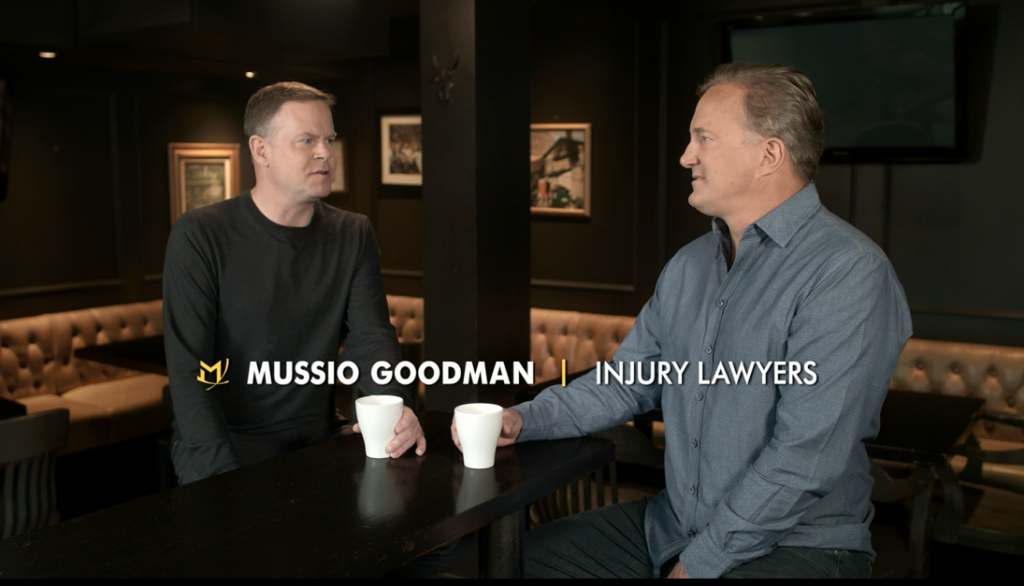Court Awards Our Client $2.2 Million at Trial, Five Times More Than ICBC’s Offer
Posted on by Mussio Goodman
Mussio Goodman is pleased to announce our recent success in the BC Supreme Court, which resulted in a significant win for our client against ICBC.
In McColl v. Sullivan, 2020 BCSC 137, Madam Justice Baker awarded our client $2.2 million dollars after a ten day trial. It is notable that our client wanted to move on from her injury claim a long time ago, and was prepared to accept far less than what the Court awarded. However, since ICBC’s settlement offer was only $435,000, five times less than what the Court determined her claim was worth, she had no choice but to take her case to trial with her lawyer, Eric Goodman.
Our client was a 25 year old woman who was rear-ended by two separate drivers a few months apart. She had just completed her education at Emily Carr University and obtained a highly sought after position in the lucrative film industry. Her talent and drive was remarked upon by all those that knew her, from the professors that taught her to the managers that quickly recognized her skills as an editor. She was described by her friends and colleagues as a friendly, kind, vivacious young woman who was enjoying her life and her new career.
As a result of the two collisions, our client suffered injuries to her neck, chest and back, which eventually developed into a permanent and debilitating nerve condition called Thoracic Outlet Syndrome (“TOS”). Her TOS causes numbness, tingling, and excruciating shooting pains down her right arm and hand, effecting her ability to perform even the most basic tasks such as chopping vegetables, using a keyboard, or washing her hair.
As a result of her injuries, our client was unable to pursue the editing career for which she trained, and was entitled to compensation for the wages she would have earned had the accidents not happened. The evidence we tendered proved that her career path was very lucrative. In particular, our client’s former boss testified as to the average earnings of our client’s specific vocation, and confirmed that our client was earmarked for future advancement due to her talent and diligence.
In response, ICBC relied on general statistics for job categories that were inapplicable to the specific career our client was actually pursing. Unsurprisingly, these statistics were for low-level work and vastly undervalued what our client was on track to earn.
Madam Justice Baker agreed that the evidence showed that our client was far more than a statistic, stating:
…I find the evidence of Ms. Turner does suggest the industry averages put forward in the evidence of Mr. Nordin and Mr. Lawless are understated for the editing work Ms. McColl would have done at Paperny. As such, I find that there is a real and substantial possibility that Ms. McColl’s loss of income is higher than the losses would be based on the reports of Mr. Nordin and Mr. Lawless…
I find that Ms. McColl has established that her earning capacity has been impaired as a result of the injuries she sustained in the accidents. Ms. McColl had successfully trained in a specialized career, obtained a good job in the film industry, and was doing very well in that job. This career would have returned her a very good income. The evidence before me was overwhelming that she will no longer be able to pursue the career she trained in and loved.
This case also provides another example of ICBC employing doctors who provide opinions that are deemed to be biased towards ICBC in the face of objective evidence. In this case, ICBC hired a vascular surgeon who opined that our client would have experienced her debilitating condition regardless of the collisions. A strong cross examination revealed the weaknesses of Dr. Fry’s opinion, leading to a stinging rebuke from Madam Justice Baker:
For the reasons I set out below, I did not find Dr. Fry’s opinion to be helpful.
Dr. Fry engaged in what I would describe as a credibility assessment of Ms. McColl, looking for inconsistencies between what she told him and what was recorded in the medical records he was provided […] Dr. Fry implied that Ms. McColl was not being honest with him about important pre-existing myofascial pain symptoms. I do not agree…
Dr. Fry also advocated that Ms. McColl would have eventually developed TOS due to her likely having a cervical rib or an elongated process of C7. He referred in a general way to literature supporting his view, but did not specify which article or study supported him. He overstated the incidence of TOS arising from a cervical rib by stating that up to 1 out of 10 people with a cervical rib will develop TOS, without clarifying that only 1% of the general population have such a cervical rib. From such a tiny fraction of the population which is vulnerable to TOS from this abnormality, Dr. Fry goes on to conclude that it is more likely than not that Ms. McColl would develop TOS. He came to this conclusion without any actual evidence that Ms. McColl has such an abnormality at all, and agreed under cross examination that he had not examined the x-ray of Ms. McColl’s cervical spine which indicated no acute bony abnormalities.
In addition to the egregious deficiencies I have identified above, I agree with Ms. McColl’s assessment of Dr. Fry’s report in general, including that Dr. Fry has included highlighted commentary throughout his report which advocates for the defence position, ventures into fact finding within the purview of the court, and challenges the honesty of Ms. McColl. Further, Dr. Fry ignored medical evidence which is not helpful to the defence position, including General Practitioner records which disclose no physical complaints prior to the first accident, and medical records which indicate numbness in the fourth and fifth fingers in Ms. McColl’s right hand.
The approach of ICBC to our client both in terms of quantifying her loss using inapplicable statistics, and using public money to hire biased medical experts, illustrates why the proposed shift to ‘no fault’ insurance in our province will leave the most vulnerable injured persons short changed.
Under the new system, our client would have received zero dollars for her pain and suffering despite having a permanent and extremely painful condition that ruined the career path she worked so hard to achieve. She would have had no access to a lawyer to fight for her rights, and would have been left without even basic funding for treatment once ICBC hired a biased expert to state that her condition would have developed regardless of the collisions.
Even if our client had cleared the obstacle of ICBC’s biased experts, her wage loss would not have been based on what her career would have been. Rather it would have been calculated based on her entry level income at the time of the MVA, a difference of hundreds of thousands of dollars.
This claim could have settled a long time ago if ICBC was run like a private, efficient corporation with some semblance of accountability. With the arrival of “no fault”, and without lawyers or judges to provide checks and balances, ICBC is about to get a whole lot worse.



